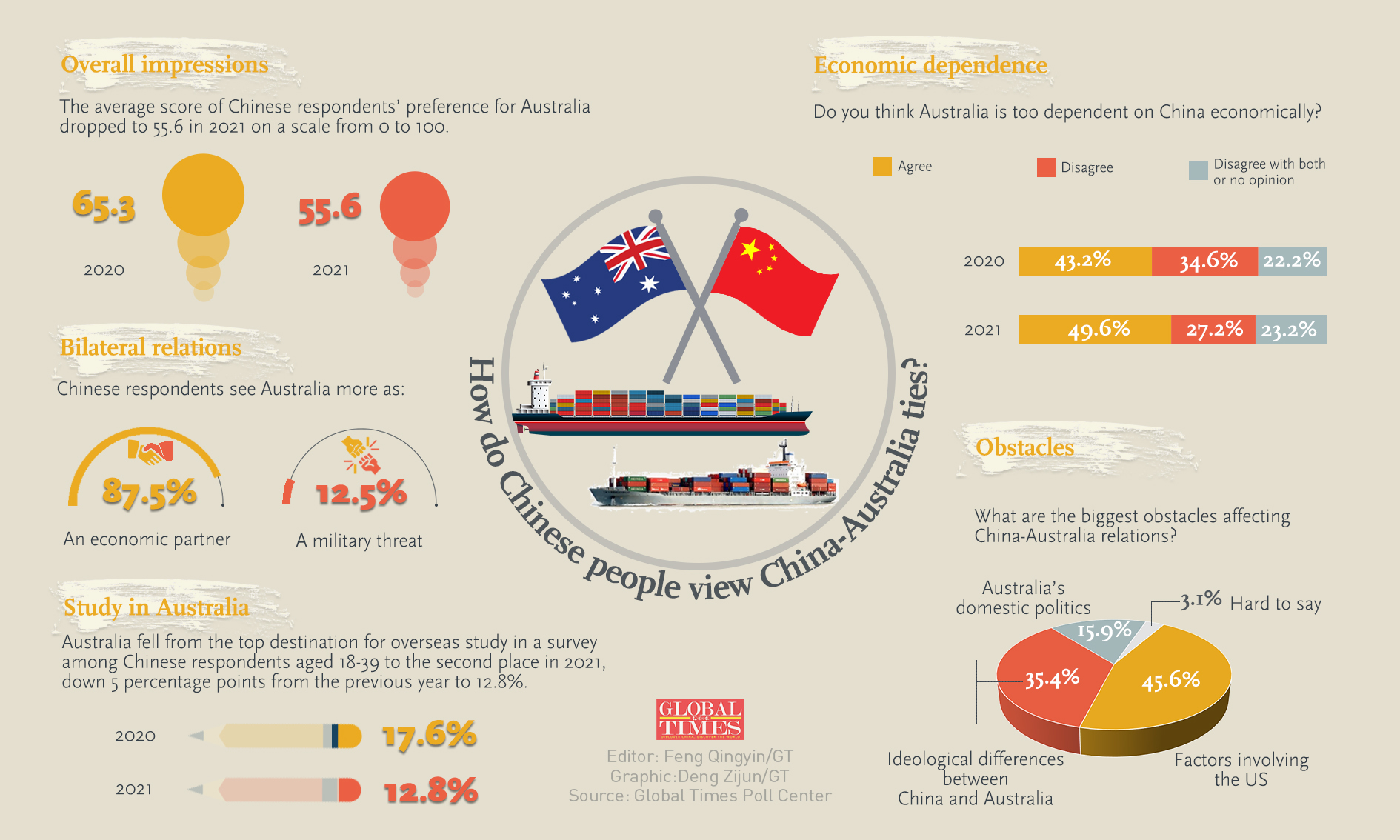
How do Chinese people view China-Australia ties? Infographic: Deng Zijun/GT
The latest Chinese public opinion poll on Australia conducted by the Global Times Research Center showed that the Chinese people have a less favorable attitude toward Australia, and more than 40 percent consider Australia a threat on military, politics and ideology rather than an economic partner, while the two-way favorable attitude between China and Australia is expected to further decline in 2021.
The survey was conducted online by the Global Times Research Center and the Australian Studies Center of Beijing Foreign Studies University from June 11 to 15, with market survey firm DATA100 collecting 2,067 respondents in 10 Chinese cities from people aged between 18 and 70. The latest poll also mirrored vision of Australians toward China based on the 2020 Lowy Institute Poll, as the Global Times survey took some questions from the Lowy Institute's survey as reference.
The average Chinese attitude toward Australia turned out to be 55.6 points - on a scale of 0 to 100 - in the poll, amid deteriorating China-Australia relations, dropping from 65.3 points from 2020 when the Global Times Research Center did a similar survey for the first time.
Such decline was also in line with the Australian survey results as the Lowy Institute Poll in 2020 showed the feelings of the Australian public toward China on a scale of 0 to 100 fell sharply in 2020 to 39.
The deteriorating impression on each other from people in the two countries mirrors souring bilateral ties. People viewed each other more negatively in the latest polls, and the trend continued this year, which shows that Australia's China bashing and the country's rising anti-China sentiment have sparked this negative trend, Chen Hong, a professor and director of the Australian Studies Center of East China Normal University, told the Global Times on Tuesday.
"Australia singlehandedly has to be responsible for such simmering public opinion. Australian media and politicians have been smearing and criticizing China on every front, be it economy, COVID-19 or other issues. Yet Australia has been less frequently mentioned in Chinese publications," Chen said.
Australia-China relations hit a tough road over the past year, as the two major economies in the Asia-Pacific had been entangled in a growing diplomatic and trade row due to anti-China sentiments fueled by some of Canberra's politicians. From hyping allegations on China's interference, to pushing forward a so-called independent review of the COVID-19 origins, to tearing up a formal Belt and Road Initiative deal, relations between China and Australia have become fraught, with observers saying such growing tension with China results from Australia's lack of political wisdom.
China's top economic planner also suspended on May 6all activities under the China-Australia Strategic Economic Dialogue, marking the first time that a bilateral diplomatic mechanism had been frozen.

Australia Photo: VCG
The US roleNearly 88 percent of Chinese respondents consider that to Australia, China is an economic partner rather than a military threat, while about 41.3 percent said to China, Australia is more like a threat on military, political and ideology fronts, while nearly half consider the US the biggest factor in interrupting China-Australia relations.
China-Australia relations had remained stable for large part of the five decades since the two countries established diplomatic relations in 1972, yet ties have been spiraling downward in recent years since Canberra started attacking China - for example, banning Huawei's 5G in 2018 and throwing mud on China in regard to the origins of the coronavirus.
"The US' anti-China strategy has stimulated the rise of similar sentiments in Australia. Yet there is not much mutual trust between Beijing and Canberra, so Australia should not risk to discard it completely simply to benefit a third country," he said.
When asked about whether they expect China-Australia ties to improve in the next two years, about 44 percent of the Chinese respondents showed a positive attitude, while 22 percent said "it's hard to say."
While the Lowy Institute survey showed that more than half of Australians consider China an economic partner and an overwhelming 94 percent of them agree that the Australian government should work to find other markets for Australia to reduce their economic dependence on China, about 50 percent of Chinese respondents agree that Australia is economically overdependent on China, according to the GT survey.
An overwhelming number of Australians calling for reducing dependence on China also shows that Australians have a growing anxiety under the hype fanned by the Australian government and media on China-related topics, which has been used many times since the COVID-19 outbreak to advocate the decoupling with China in order to boost Australia's manufacturing, according to an analysis the Australian Studies Center of the Beijing Foreign Studies University made in the survey.
Despite an icy trade relationship, Chinese imports from Australia in May rose 55.4 percent year-on-year according to official data. "Australia has been trying to reduce imports like clothes from China as much as it can, and find alternative sources such as India, Vietnam and Sri Lanka. But it's hard for them to find bulk commodity exporters that can replace China," Yu Lei, chief research fellow at the research center for Pacific island countries of Liaocheng University in East China's Shandong Province, told the Global Times on Tuesday.
China has been insisting on depoliticizing the economy and trade sectors. Whether China will take further countermeasures on Australia depends on Australia's attitude and policy direction, Yu said, noting that China can take action against Australia on all products except for iron ore, as iron ore is the only commodity which China has difficulty finding an alternative source.
People-to-people ties affectedUnder the current situation, the willingness of the Chinese respondents to travel to and study in Australia would be affected by the souring bilateral relationship.
Among those from 18 to 39 years old, 15.5 percent favor the UK as the top destination for their overseas studies, the survey showed. The mention rate of Australia on the list of top destinations for Chinese international students dropped 5 percentage points in 2021.
Some Chinese students in Australia who talked with the Global Times said the deteriorating ties also made them change their mind working or living longer in the country, especially as Australian politicians and media have been keen on China bashing.
Liu Yue, a PhD student finally went to study at the Monash University this year after waiting for his visa for more than a year. Liu told the Global Times that he used to think Australia is just another Western country. Yet after its tussles with China, he realized it is a stupid country willingly to serve as the US vassal.
If he was given another choice to choose a foreign country to study, Liu said he would take politics into consideration. "I was too naive at that time. I got offers from UK, Hong Kong and Australian universities. I chose Australia without thinking about politics, but I had never anticipated it would trap me."
The unfriendly policies Australia took have been the underlying reason behind the reduced willingness of Chinese people to choose Australia as their top overseas tourism or education destination, Yu said, noting that the unfriendly policies have caused racism to rise in Australia.
It happens from time to time that Chinese students studying in Australia had been attacked but with no sufficient investigations from the local police, which discourage Chinese students from going to study there, he noted.
It's wishful thinking in Australia that the bilateral relationship won't affect the economic exchange and services trade. As the relationship further declines, the number of Chinese students to Australia has been dropping since 2018 with sluggish tourism growth, the Global Times survey showed.
Australia's policies toward China won't change in the short term, and the number of Chinese students studying in Australia will increase only slightly, Yu predicted.





